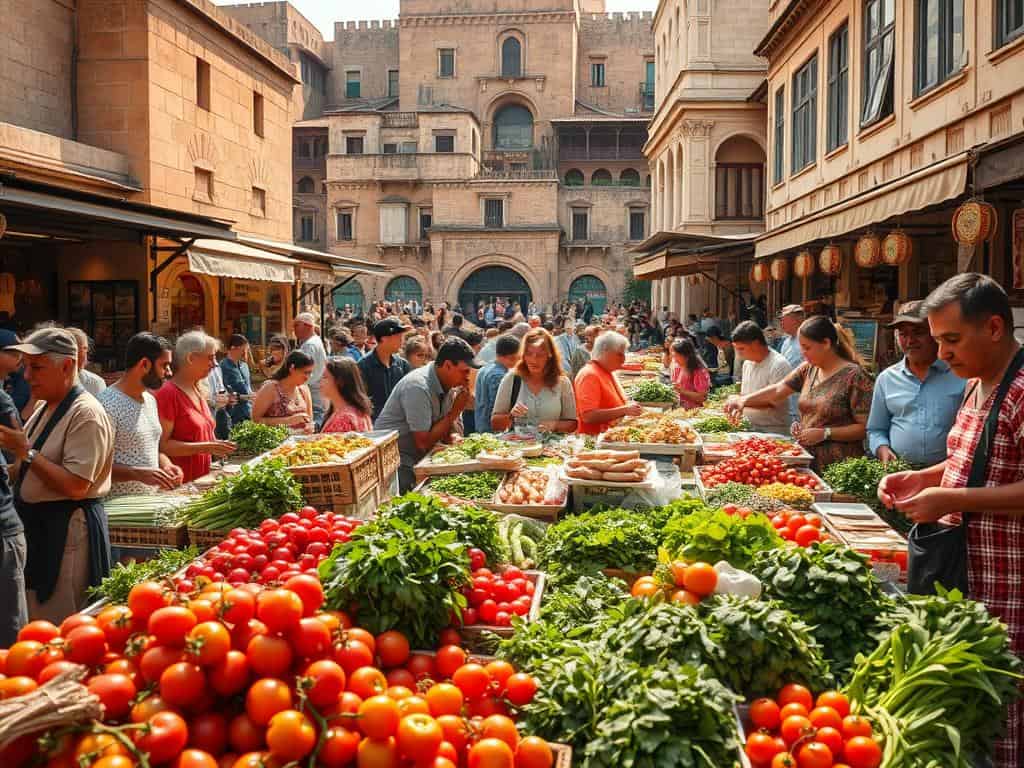As a child, family gatherings filled my home with warmth. The air buzzed with the smell of spices and roasted meats. My grandmother used old techniques to make simple ingredients into amazing dishes. She didn’t just share food; she shared parts of our family’s history.
Every bite of her famous gumbo was like a story of our heritage. It mixed tales of our ancestors with the cultural dishes that made us. In those moments, I saw how food and culture are deeply connected. Culinary traditions link us to our past.
They let us explore flavors from around the world. Sharing a meal is like telling a story. It wraps our experiences, traditions, and feelings into each dish.
Key Takeaways
- Food and culture are intricately linked, each informing the other.
- Culinary traditions offer a window into the historical narratives of communities.
- Cultural dishes evoke emotional memories and foster connections.
- Meals are storytelling devices that convey the evolution of societies.
- Understanding food history deepens our appreciation for shared human experiences.
The Connection Between Food and Culture
The bond between food and culture is both deep and complex. Every meal has its story, showing the depth of cooking traditions influenced by history and geography. I’m struck by how food goes beyond just feeding us. It becomes a vital way for people to show who they are and what they believe in.
Food as a Means of Expression
Food is a strong way to communicate. Through unique dishes, people share their life stories, beliefs, and feelings. Take a family recipe. It does more than fill the stomach. It links generations and offers a peek into a culture’s history, letting us taste and understand a community’s emotions and past.
Historical Influences on Culinary Traditions
History like migration and colonization has shaped our food. These events brought in new spices and tastes, leading to the wide variety of foods we see today. When I try different cultural foods, I can taste the stories of people’s journeys in each dish.
Food as a Reflection of Identity
Food reflects who we are, both as individuals and groups. Preparing and eating specific foods strengthens connections and shows we belong. I’ve noticed that many traditions stress the role of food in festivals. This shows how cooking helps define group norms and roles. Exploring a community’s food and culture lets me see their identity layers.

Food and Culture: The Role of Culinary Traditions
Culinary traditions are key in our lives, linking heritage to community. Each dish fills us up and tells a culture’s history and values. By exploring culinary arts, we dive into the richness of food and culture. This journey highlights how traditional recipes have their roots deep in culture.
Storytelling Through Culinary Arts
Each cultural meal tells a tale through its ingredients, making, and serving. While enjoying a dish, I see connections to past generations. Culinary traditions let us see cooking as an art, blending flavors that tell of a place and its people, across centuries.
Cuisine as a Medium for Social Exchange
Food is key in bringing people together for celebration and sharing. Family recipes stand for unity and ties within communities. Sharing meals fosters understanding and friendship, linking us to our roots and opening doors to new cultures.
Globalization’s Impact on Local Foods
Globalization affects local foods in many ways. Traditions evolve yet face challenges that may weaken cultural dishes. I see how new flavors can enrich local foods but also blur unique identities. This situation makes us think about celebrating diversity while keeping traditional recipes true.
Conclusion
Exploring food and culture shows a deep link between them. Every plate has a story, full of flavors that tell of traditions and dishes passed down generations. Knowing the history of our food makes us appreciate our diverse society more.
Food fulfills more than just our hunger. It connects us to our heritage and community. When we share meals, we exchange values and traditions. This lets us celebrate our unique backgrounds. By valuing our food history, we connect different cultures, creating understanding and respect.
In a world that’s becoming more connected, keeping our food traditions is key. Every dish has a story from where it came, filled with history and people. By cherishing these stories, we keep past flavors alive for the future. This enriches the global mix of food and culture.



